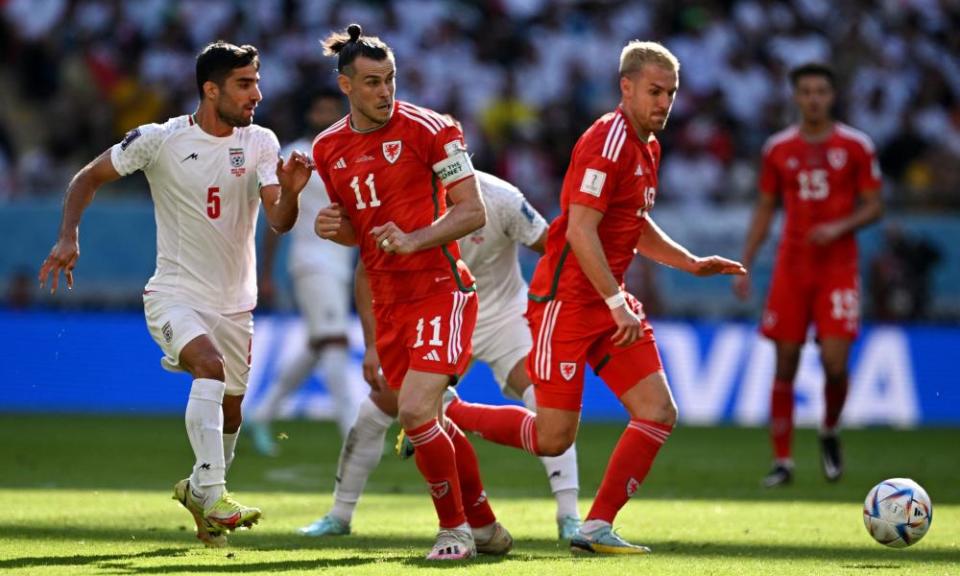Gareth Bale and Aaron Ramsey unable to turn back time as Wales struggle

Did a pair of painfully pale performances against Iran signal the beginning of the end for Gareth Bale and Aaron Ramsey? It was the elephant in the room after Wales’s defeat on Friday but Rob Page quickly swallowed the question and, such was the manager’s disappointment after a jarring loss that left his team staring at elimination, insisted now was not the time. Page did, however, concede Wales were punished because too many key players allowed the occasion to pass them by.
Bale, Wales’s all-time men’s leading goalscorer and now their most-capped male player, is almost unanimously cherished as the team’s greatest export. For a few years, regardless of the minutes he has totted up at club level, he has been able to pull on a Wales shirt, find a way to manipulate games and, frankly, make lots of people look silly. Perhaps he will do so again against England on Tuesday, but on recent evidence this tournament has been a strain. Ramsey should also have been sacrificed long before Wayne Hennessey was sent off against Iran with four minutes of normal time to play.
This is a World Cup like no other. For the last 12 years the Guardian has been reporting on the issues surrounding Qatar 2022, from corruption and human rights abuses to the treatment of migrant workers and discriminatory laws. The best of our journalism is gathered on our dedicated Qatar: Beyond the Football home page for those who want to go deeper into the issues beyond the pitch.
Guardian reporting goes far beyond what happens on the pitch. Support our investigative journalism today.
It is impossible to dress up how underwhelming Wales, and especially their protagonists, have been at their first World Cup for 64 years. Bale has offered next to nothing, except winning and then executing a penalty against USA. For the first 13 minutes against Iran, his only touch and sole contribution was taking kick-off. Ramsey went blond on the eve of the tournament, providing a promising parallel to when he dyed his hair for Euro 2016 in France, but against Iran he gave the ball away more than any other player on the pitch. Hennessey, among three centurions in the Wales squad, also endured a nightmare afternoon. Bale and Ramsey, though, have appeared stalked by the storied and uncharted success of yesteryear.
The manner in which Bale, 33, and Ramsey, almost 32, struggled to get around the pitch, labouring towards the ball in one breath and their opponent the next, should not have come as a surprise given the paucity of minutes they have played this year. Ramsey has started 10 league games in 2022; Bale just three – two games in five days looked a shock to the system. Bale, used to the luxury of a week to recover between matches at Los Angeles FC, admitted it took him a good while to feel his legs after going the distance against the USA, completing 104 minutes, and four days later he – just about – managed another 102 minutes. Before Monday, Bale had played 36 minutes since September.
At some point it was inevitable the music would stop. “That’s the problem we always have, asking players who are not playing for their clubs to come and give performance after performance,” Page said. “We are going to have to look at it and, if necessary, we’ll have to make the changes to freshen it up.”
The warning signs were there. Joe Allen, a tidy and reliable midfield anchorman, was painted as something of a messiah in some quarters upon news of his comeback from a hamstring injury. It is saying something when, with respect to Allen, Wales’s hopes of turning the game on its head hinged on a 32-year-old who has spent the past five seasons in the Championship, his best days undeniably behind him. Allen replaced Ethan Ampadu on Friday in what, surprisingly, was a like-for-like substitution. Suddenly, after more than two months on the sidelines, it was Allen’s time to operate as the lone firefighter on an uncontrollable blaze. No wonder he also struggled, squandering possession in the buildup to both Iran’s stoppage-time goals.
Page’s post-match demeanour was of a manager let down by senior players, but he will also surely ponder whether he made the right calls. Ampadu was valiant but swamped at the base of midfield. Joe Morrell, a regular under Page until Qatar, has been limited to playing 10 minutes of stoppage time against the USA but would surely have helped balance the midfield, and Page’s determination to play Harry Wilson, Ramsey and Bale left his defence exposed. Joe Rodon was repeatedly having to fend off Iran forwards in one-on-one scenarios.
It is hard not to think Wales would have been better served with Bale drifting in from the right, with Kieffer Moore as a focal point down the middle and Daniel James, a dependable and tenacious winger, on the opposite flank. James arrived from the bench on Friday alongside Brennan Johnson, who has often provided Wales with a welcome zest as a substitute, even if too little too late. Johnson, who played for England Under-17s, surely has to start on Tuesday.
England’s draw with the USA gives Wales a sliver of hope of progressing, but the permutations required feel far-fetched. Wales must beat England – a feat they have not achieved since 1984 – and hope Iran and the USA play out a draw, otherwise they need to beat England by four goals.
Before England’s stalemate on Friday, Page seemed resigned to his side’s fate, unable to shake the gnawing sense that the end is nigh. “We want to finish the competition on a high,” he said.

 Yahoo Sports
Yahoo Sports 